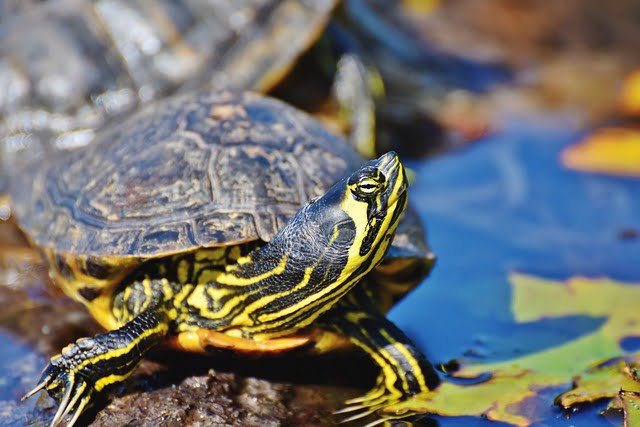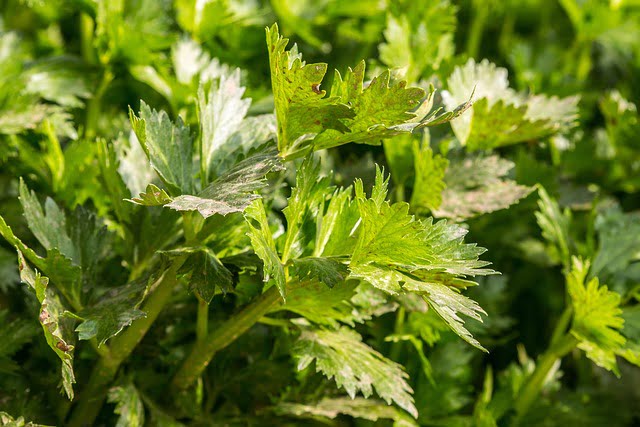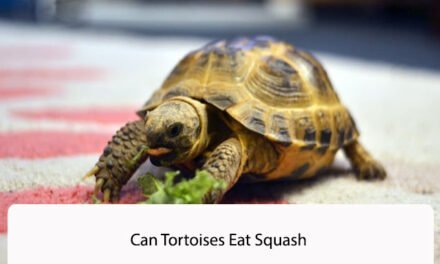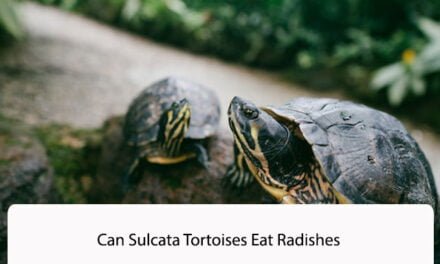Sulcata tortoises are fascinating creatures that are known for their large size and unique personalities. As with any pet, it’s important to ensure that they are receiving a well-balanced diet that meets their nutritional needs. One question that many sulcata tortoise owners have is whether or not their pets can eat celery.
Celery is a popular vegetable that is often used in salads, soups, and other dishes. It’s low in calories and high in fiber, making it a great choice for humans who are looking to maintain a healthy diet. However, when it comes to feeding celery to sulcata tortoises, there are a few things to consider. In this article, we’ll explore whether or not it’s safe for sulcata tortoises to eat celery, and what precautions you should take if you decide to feed it to them.
When it comes to feeding sulcata tortoises, it’s important to remember that they have specific dietary requirements. They need a diet that is high in fiber and low in protein and fat. While celery is a low-calorie vegetable that is high in fiber, it’s also relatively low in other important nutrients that tortoises need to thrive. As a result, it should not make up a significant portion of their diet, but can be offered as a supplement to their regular food.

Understanding Sulcata Tortoises’ Dietary Needs
Sulcata tortoises are herbivores, meaning that they eat only plants. As their owners, it is our responsibility to ensure that they receive a balanced diet that meets all of their nutritional needs. In this section, we will discuss the dietary needs of sulcata tortoises and provide guidance on what foods to feed them.
Staple Foods
Sulcata tortoises require a diet that is high in fiber and low in protein and fat. Their staple foods should consist of grasses, hay, and leafy greens. Some examples of suitable foods include:
- Timothy hay
- Bermuda grass
- Dandelion greens
- Collard greens
- Mustard greens
- Kale
- Endive
- Escarole
- Romaine lettuce
It is important to provide a variety of these foods to ensure that your tortoise receives all of the necessary vitamins and minerals.
Treats
In addition to their staple foods, sulcata tortoises can also be given treats in moderation. Some suitable treats include:
- Carrots
- Squash
- Sweet potato
- Bell peppers
- Cactus pads
- Watermelon
- Strawberries
It is important to note that treats should only make up a small portion of your tortoise’s diet. Too many treats can lead to obesity and other health issues.
Foods to Avoid
There are some foods that should be avoided when feeding sulcata tortoises. These include:
- High-protein foods, such as meat, dairy, and eggs
- Fruits that are high in sugar, such as grapes and bananas
- Foods that are high in oxalates, such as spinach and Swiss chard
- Foods that are high in phosphorus, such as broccoli and brussels sprouts
By understanding the dietary needs of sulcata tortoises and providing them with a balanced diet, we can help ensure that they live long, healthy lives.
Can Sulcata Tortoises Eat Celery: The Facts
Sulcata tortoises are herbivores, and they require a diet that is high in fiber and low in protein. They enjoy a variety of vegetables, including celery. However, it is important to understand the nutritional value of celery and how it can affect the health of your tortoise.
Celery is a crunchy, low-calorie vegetable that is high in water content. It also contains a variety of vitamins and minerals, including vitamin K, vitamin C, and potassium. While celery can be a healthy addition to your tortoise’s diet, it should be given in moderation.
Excessive consumption of celery can lead to digestive issues, such as diarrhea and bloating. It can also cause an imbalance in the calcium-to-phosphorus ratio, which can lead to shell deformities and other health problems.
When feeding celery to your sulcata tortoise, it is important to chop it into small pieces and mix it with other vegetables to create a balanced diet. You should also avoid feeding your tortoise the leaves and stems of the celery, as they can be tough to digest.
Overall, celery can be a healthy addition to your sulcata tortoise’s diet when given in moderation. As with any new food, it is important to introduce it slowly and monitor your tortoise’s health for any signs of digestive distress.
Benefits of Celery for Sulcata Tortoises
Celery is a healthy and nutritious vegetable that can be a great addition to a sulcata tortoise’s diet. Here are some of the benefits of feeding celery to your sulcata tortoise:
- High in Fiber: Celery is high in fiber, which helps promote healthy digestion in sulcata tortoises. It can also help prevent constipation and other digestive issues.
- Rich in Vitamins and Minerals: Celery is a good source of vitamins A, C, and K, as well as minerals like potassium and calcium. These nutrients are important for maintaining a healthy immune system, strong bones, and overall health.
- Low in Calories: Celery is a low-calorie food, which makes it a great option for sulcata tortoises who need to maintain a healthy weight. It can also be a good choice for tortoises who are prone to obesity.
When feeding celery to your sulcata tortoise, it is important to remember that it should only be given in moderation. Too much celery can cause digestive issues, and it should never be the main component of your tortoise’s diet.
In addition, it is important to wash celery thoroughly before feeding it to your tortoise to remove any pesticides or other harmful chemicals that may be present. Finally, make sure to cut celery into small pieces to make it easier for your tortoise to eat and digest.
Overall, celery can be a healthy and nutritious addition to a sulcata tortoise’s diet when fed in moderation and prepared properly.

Potential Risks of Feeding Celery to Sulcata Tortoises
Feeding celery to sulcata tortoises can be risky, as it contains high levels of oxalic acid. Oxalic acid can bind to calcium in the tortoise’s body, leading to calcium deficiency and metabolic bone disease. This can result in the tortoise’s shell becoming soft and deformed, making it vulnerable to injury and infection.
In addition to its high oxalic acid content, celery also contains a significant amount of water. While hydration is important for sulcata tortoises, consuming too much water can cause diarrhea and dehydration. This can be especially dangerous for young or sick tortoises, as they may not be able to handle the stress on their bodies.
Furthermore, celery can also be a choking hazard for sulcata tortoises, especially if it is not chopped into small pieces. The tortoise’s digestive system is not designed to handle large pieces of food, and they may become lodged in the tortoise’s throat or digestive tract, causing blockages and other health issues.
Overall, while celery may seem like a healthy and nutritious food for sulcata tortoises, it is important to consider the potential risks before adding it to their diet. If you do choose to feed your tortoise celery, make sure to chop it into small pieces and offer it in moderation, alongside a balanced and varied diet.
How to Safely Introduce Celery to a Sulcata Tortoise’s Diet
When it comes to feeding your Sulcata tortoise, it’s important to ensure they are getting a balanced diet. While celery can be a healthy addition to their diet, it’s important to introduce it safely. Here’s what you need to know:
Portion Size
When introducing celery to your Sulcata tortoise’s diet, it’s important to start with small portions. We recommend starting with a piece of celery that is no larger than the size of their head. This will help prevent any digestive issues that may occur from eating too much at once.
Frequency
Celery should be given to your Sulcata tortoise in moderation. We recommend feeding it to them no more than once a week. This will help ensure they are getting a balanced diet and not consuming too much of any one type of food.
It’s important to note that while celery can be a healthy addition to your Sulcata tortoise’s diet, it should not be the only thing they are eating. We recommend feeding them a variety of greens, vegetables, and fruits to ensure they are getting all the nutrients they need.
In summary, when introducing celery to your Sulcata tortoise’s diet, start with small portions and feed it to them in moderation. By following these simple guidelines, you can safely add celery to your Sulcata tortoise’s diet and ensure they are getting a balanced diet.
Alternatives to Celery for Sulcata Tortoises
While celery is a healthy vegetable that can be fed to sulcata tortoises, it is not the only option. Here are a few alternatives to celery that can be included in a sulcata tortoise’s diet:
Romaine Lettuce
Romaine lettuce is a great alternative to celery. It is low in oxalates and high in fiber, which makes it a great source of nutrition for sulcata tortoises. We recommend feeding romaine lettuce in moderation, as it is also low in calcium.
Collard Greens
Collard greens are another great option for sulcata tortoises. They are high in calcium and low in oxalates, which makes them a healthy addition to their diet. We recommend feeding collard greens in moderation, as they can be high in goitrogens.
Dandelion Greens
Dandelion greens are a great source of nutrition for sulcata tortoises. They are low in oxalates and high in calcium, which makes them a great addition to their diet. We recommend feeding dandelion greens in moderation, as they can be high in fiber.
Squash
Squash is a great source of nutrition for sulcata tortoises. It is low in oxalates and high in fiber, which makes it a healthy addition to their diet. We recommend feeding squash in moderation, as it is also low in calcium.
Carrots
Carrots are a healthy vegetable that can be fed to sulcata tortoises. They are low in oxalates and high in fiber, which makes them a great source of nutrition. We recommend feeding carrots in moderation, as they are also low in calcium.
Overall, there are many healthy alternatives to celery that can be included in a sulcata tortoise’s diet. It is important to feed a variety of vegetables to ensure that they are getting all of the necessary nutrients.
Conclusion
After conducting thorough research and analysis, we have come to the conclusion that celery is not an ideal food for Sulcata tortoises. While celery is not toxic to these tortoises, it does not provide them with any nutritional value.
Sulcata tortoises require a diet that is high in fiber and low in protein and fat. Celery does not meet these requirements and can actually lead to digestive problems if consumed in large quantities.
It is important to provide Sulcata tortoises with a balanced diet that includes a variety of leafy greens, vegetables, and fruits. Some suitable options include kale, collard greens, dandelion greens, carrots, and squash.
In summary, while Sulcata tortoises may nibble on celery if offered, it is not a recommended food for them. It is important to prioritize their health and wellbeing by providing them with a diet that meets their specific nutritional needs.

Frequently Asked Questions
What vegetables are safe for sulcata tortoises?
Sulcata tortoises are herbivores and need a diet high in fiber and low in protein. They can eat a variety of vegetables, including dark leafy greens, squash, bell peppers, and carrots. It is important to avoid vegetables high in oxalic acid, such as spinach and rhubarb, as well as vegetables high in protein, such as beans and peas.
Can tortoises eat carrots and celery?
Yes, sulcata tortoises can eat carrots and celery, but they should be fed in moderation. Carrots are high in sugar, so they should only be given as an occasional treat. Celery is low in nutritional value, so it should also be given in moderation.
Can desert tortoises eat celery?
Desert tortoises can also eat celery, but like sulcata tortoises, it should be given in moderation. Desert tortoises have a more restricted diet than sulcata tortoises, so it is important to ensure that they are getting the proper balance of nutrients.
Can Sulcata tortoises eat tomatoes?
Tomatoes are safe for sulcata tortoises to eat, but they should be given in moderation. Tomatoes are high in acid, which can cause digestive issues if given in large quantities. It is important to remove the seeds and skin before feeding tomatoes to your tortoise.
Can tortoises eat lettuce?
Lettuce is safe for tortoises to eat, but it is not a very nutritious food. Iceberg lettuce, in particular, has very little nutritional value. It is best to feed your tortoise a variety of dark leafy greens, such as kale, collard greens, and mustard greens.
Can tortoises eat cucumber?
Yes, tortoises can eat cucumber, but like celery, it is low in nutritional value and should be given in moderation. Cucumbers are high in water, so they can be a good way to help keep your tortoise hydrated.




